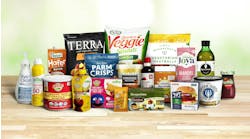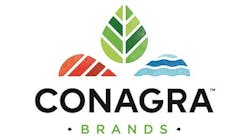For the past couple of these Top 100© reports, we’ve chronicled annual sales declines for some of the biggest food and beverage companies in the U.S. and Canada. We hedged last year, putting a question mark at the end of the headline A Return to Topline Growth?
This year we remove the question mark. While it’s still tough to be Big Food in the Age of the Entrepreneur, some of the top 25 companies that suffered two or three consecutive years of sales declines got back on the growth track in 2018 – in many cases by buying the entrepreneurs and other competitors.
See the table. Seven top-tier companies – Kraft Heinz, Mondelez, General Mills, Kellogg, Conagra, Campbell Soup and JM Smucker – all recorded sales increases in their most recent fiscal years after at least three consecutive years of sales declines. But it didn’t come without a cost: Five of those seven saw net incomes erode.
On the other hand, blue chip Coca-Cola Co. is in its seventh straight year of sales declines. Also on the other hand, the company’s 2018 net income was up fivefold over that of 2017, to $6.434 billion. Back in 2012, Coke had companywide/global sales of $48 billion, but it’s been downhill ever since. Last year’s total sales were $31.856 billion.
That points to a strategy being followed by some companies: that after years of acquisitions (some with questionable multiples) executives are realizing it may be easier and more profitable to manage a smaller, focused company than a sprawling, diverse one.
That’s the strategy currently pursued by Campbell Soup, TreeHouse Foods and Hain Celestial, all of which are selling off tangential businesses acquired by previous CEOs. (Interestingly, the new CEOs at both Campbell and Hain Celestial were the No. 1 and No. 2 guys at Pinnacle Foods until their company was gobbled up by Conagra.)
Campbell’s longtime CEO Denise Morrison was ousted in May of last year. Even before the arrival of new CEO Mark Clouse (ex-Pinnacle), Morrison’s tangential acquisitions were put on the block. Divestitures this year have been Garden Fresh Gourmet, Bolthouse Farms, Europe’s Kelsen Group and Australia’s Arnott’s, the last of which constituted the largest part of Campbell’s international product portfolio. Those last two deals are still pending.
Hain Celestial’s new CEO Mark Schiller (also ex-Pinnacle) sold its Pure Protein division (including chicken brands FreeBird and Empire Kosher) and the WestSoy tofu, seitan and tempeh businesses.
TreeHouse Foods’ new CEO Steve Oakland (ex-Smucker) has sold McCann’s Irish Oatmeal, the ready-to-eat cereal business and snacks (essentially trail mix and nuts).
Similar shrinkage was the strategy pursued by Conagra – until last year’s blockbuster acquisition of Pinnacle Foods for $10.9 billion. After a disastrous $6.8 billion purchase of Ralcorp in 2012 and back-to-back $600 million losses in 2014 and 2015, Conagra’s CEO was replaced and the company retrenched. Apparently Sean Connolly, chief executive since 2015, felt the company was ready to resume hunting.
Backtracking a bit, if you have trouble finding that $31.856 billion number for Coca-Cola in our big table, look in the third column of figures. For Food Processing’s Top 100, we rank companies based on value-added/consumer-ready (but not necessarily branded or in final form) foods and beverages that were manufactured in U.S. and Canadian plants. That’s why Coke is listed at No. 9 with $11.691 billion in sales, not $32 billion – the rest of its sales and manufacturing is global.
That’s also why No. 1 PepsiCo’s figure is under $40 billion, not the $64 billion the company has in global sales. Cargill appears as an $8.9 billion meat packer, not a $113 billion owner of ships, trains and iron ore mines around the globe. ADM is not on the chart at all. Monster Beverage Corp., even at $3.8 billion in sales, is not on this list (the company manufactures none of its own beverages; all are done by copackers).
Food Processing's Top 100© By the Numbers
On the following two pages you’ll find our big Top 100 table, the 100 largest food and beverage companies in the U.S. and Canada. Among those 100 companies, 43 saw sales increases in 2018 or their most recent fiscal year; 22 recorded sales declines.
Profitability, on the other hand, is not doing so well. 20 companies saw improvement in their net earnings last year while 27 suffered declines in that category. Five companies – Kraft Heinz, Dean Foods, TreeHouse Foods, Seaboard Corp. and Del Monte Pacific – recorded red ink.
The biggest financial news of the current year, which is impacting its previous year’s financial report, was Kraft Heinz’s February meltdown. Company executives wrote down the value of some of its best-known brands by $15.4 billion, cut the dividend and generally acknowledged that management’s past success at simultaneously cutting costs and raising value was not working.
The Pittsburgh-Chicago company was the paragon of efficiency, slashing costs while maintaining sales at about $26 billion. The result was soaring profitability – nearly $11 billion profit in 2017 on sales of $20.5 billion. How’s that for a margin? But it all came crashing down early this year; that $11 billion profit turned into a $10 billion loss for 2018. And this is the company that in 2017 made a $143 billion bid for Unilever.
Pet food remained a good diversification strategy for general food companies. General Mills started out 2018 by offering $8 billion for Blue Buffalo Pet Products. J.M. Smucker Co., already deeply invested in the category with the 2015 purchase of Big Heart Pet Brands (a large stable of familiar brands including Gravy Train and Meow Mix) last year added Ainsworth Pet Nutrition, which includes the Rachael Ray Nutrish brand, for $1.7 billion. Even ingredient companies Cargill, ADM and Symrise made small acquisitions in the space.
A category-altering deal was Nestle’s exit from the U.S. candy business. Such brands as Crunch, Baby Ruth and Butterfinger, as well as non-chocolate candies, were up for auction. The winner with a bid of $2.8 billion was Italy’s Ferrero Group, which immediately became the No. 3 candy company in North America. And as a result, Ferrero USA/Ferrara Candy Co. moved up seven places in our ranking.
But the biggest jump belongs to Hearthside Food Solutions. The equity fund-owned portfolio of regional bakeries doubled its size with the 2018 acquisition of Greencore USA from the latter’s Irish parent. The acquisition added $1.4 billion in sales of refrigerated sandwiches, entrees and salad kits.
Not far behind was Bonduelle N.A., up 53%. U.S. sales now account for 37%, the biggest share of the French company’s revenues, and Canada adds another 10% – most the result of the 2017 acquisition of Ready Pac Foods (now called Bonduelle Fresh Americas).
Not far behind Bonduelle was the performance of Canada’s Premium Brands Holdings Corp. Sales jumped 26%, to US$2.2 billion thanks to 10 acquisitions. During 2018, the company invested C$753 million to buy The Meat Factory Ltd., Frandon Seafoods Inc., Country Prime Meats Ltd., McLean Meats Inc., Penguin Meats Supply Ltd., Concord Premium Meats Ltd., Oberto Sausage Co., Select Food LLC, Yorkshire Valley Farms Ltd., Ready Seafood Co., L.Walker Seafoods Ltd. and Smokemasters Gourmet Food.
A note about Canadian companies: Because the Canadian dollar decreased from nearly 80 cents U.S. on Dec. 31, 2017 to 73 cents U.S. on Dec. 31, 2018, some of the Canadian companies increased 2018 sales in their local currency, but our table shows declines because of the currency conversion to U.S. dollars.


